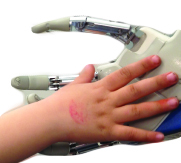IPRES
Human-Robot Interaction constitutes a research area of increasing interest looking for the progressive achievement of the migration of an explicit informatics control to a conceptually implicit control. The interest of this interaction grows as applications of robotics tend to operate in more and more cooperative environments. This is especially true in medical applications.
The proposed project is oriented to advance in human-robot cooperation and interaction issues, especially in the medical field. Here we consider both surgeon-robot interaction in surgical applications, as well as user-robot interaction in assistance and rehabilitation.
In order to tackle the human-robot interaction problem it is necessary to consider perception techniques, being either based on contact or remote sensing. Touch perception can be of mechanical type (position, force and touch sensors) or electrical (biofeedback). Remote perception is based generally on optical techniques, either based on video cameras or on scanning laser.
On the other hand, it is necessary to consider an intelligent interpretation of the perceived information, which carries with it either the integration of multimodal information, as the analysis of its temporal evolution, with which the users’ gesture, intention or will can be interpreted. It will also be necessary to add a learning process aiming to progressively incorporate new robot behaviours that provide them with a more intelligent actuation, in order to facilitate future works to be carried out progressively.
The project aims to tackle the following goals:
- Significant advance in compliant, efficient and reliable interaction systems in high safety environments (applied to the medical field).
- Application of theories of affordance to achieve an interaction that can be considered friendly in stress/tiredness situations (of application in the medical field).
- Development of a set of demonstrators based on assisted teleoperation, endowed with a compliant interactive interface. The foreseen demonstrators will be applied to the assistance in surgical, domestic and rehabilitation environments.
In order to achieve these practical goals, it is the aim of this project to produce significant contributions in the following areas:
- Processing of multimodal information, specially including new 3D perception techniques.
- Improvement of perception techniques of human movements and actuations, as well as achieving more efficient interactions in the context of cooperative operation.
- Cooperative strategies among heterogeneous agents (human and robots).
- Learning techniques in the context of cooperation techniques.
Research Centers
- FUNDACIO PRIVADA INSTITUT DE BIOENGINYERIA DE CATALUNYA (IBEC)
- FUNDACIO PARC TAULI
- UNIVERSITAT POLITECNICA DE CATALUNYA (UPC)
- UNIVERSIDAD MIGUEL HERNANDEZ DE ELCHE (UMH)
Duration
January 1st, 2012 – December 31th, 2014
Financial Entity
Ministerio de Ciencia e Innovación, Spanish Government


